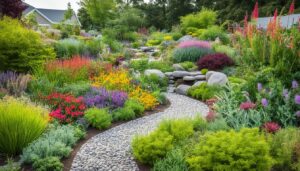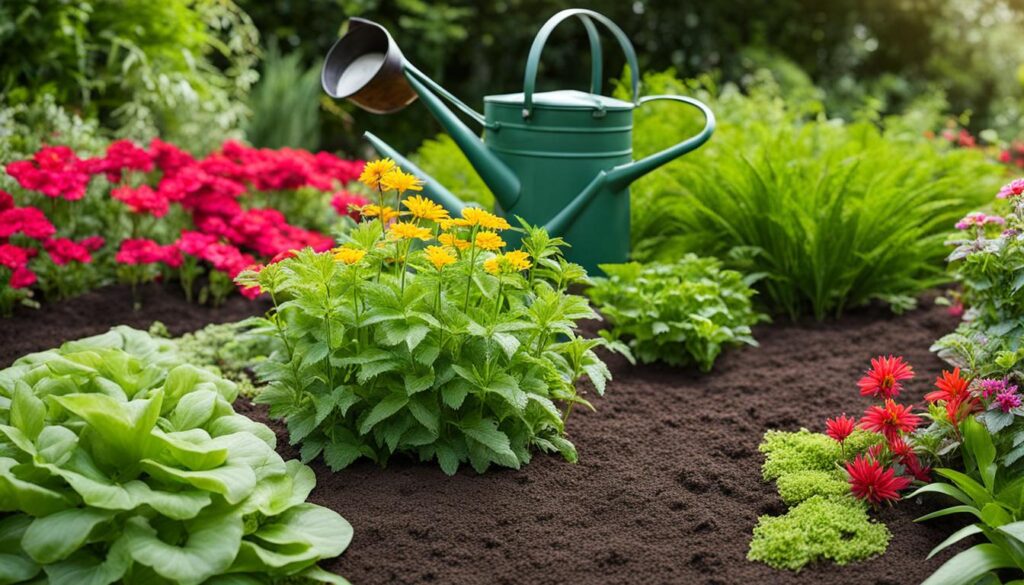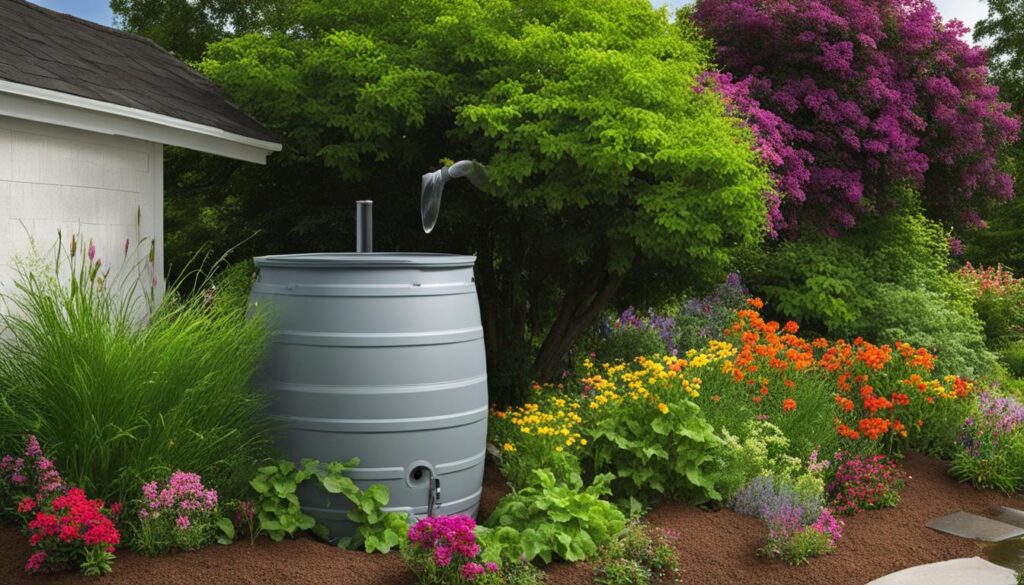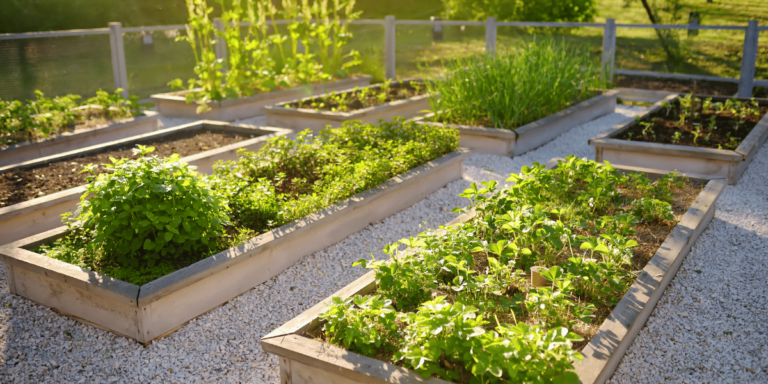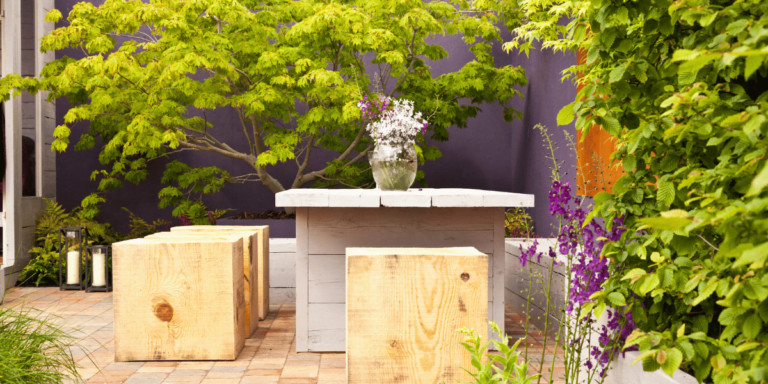Creating a beautiful outdoor space doesn’t have to be a tiring chore. With low maintenance eco gardens, you can enjoy the benefits of a lush and vibrant landscape without the constant effort and upkeep. In this article, we will explore the concept of sustainable urban gardening and eco-friendly landscape design, providing you with practical tips to create a garden that thrives with minimal intervention.
Key Takeaways:
- Low maintenance eco gardens offer a sustainable and hassle-free approach to landscaping.
- Choosing native plants reduces the need for constant care and supports local wildlife.
- Mulching improves soil health, regulates temperature, and conserves water.
- Implementing water-saving techniques such as rainwater harvesting and drought-tolerant plants reduces water usage.
- By following these strategies, you can create a beautiful and eco-friendly garden that requires minimal effort.
Choose Native Plants for a Low Maintenance Landscape
Creating a low maintenance eco garden is all about making smart choices that benefit both your garden and the environment. One of the key strategies for achieving this is to choose native plants.
Native plants are plants that naturally occur in a specific region and have adapted to the local climate and soil conditions over time. They have evolved to thrive in their native environment, which means they require minimal care once established.
When you choose native plants for your garden, you’re selecting species that are already well-suited to the local weather patterns and soil types. This means they will be more resilient and less susceptible to damage or disease.
Low maintenance is one of the biggest advantages of using native plants in your landscape design. Once established, native plants typically require less water, fertilizer, and overall maintenance compared to non-native species. This can save you time, effort, and resources in the long run.
Furthermore, native plants have developed natural defense mechanisms against local pests and diseases. They are inherently resistant to common issues, which reduces the need for chemical pesticides or other interventions that can harm the environment.
In addition to their low maintenance qualities, native plants also play a vital role in supporting local wildlife. They provide food, shelter, and habitat for a variety of species, including birds, butterflies, bees, and other beneficial insects.
By incorporating native plants into your landscape, you can create a vibrant and biodiverse ecosystem that attracts and supports local wildlife populations. This not only enhances the beauty and vitality of your garden but also contributes to the overall health and balance of the local environment.
| Benefits of Choosing Native Plants |
|---|
| Low maintenance |
| Pest and disease resistance |
| Habitat for local wildlife |
| Enhances biodiversity |
Overall, selecting native plants for your low maintenance eco garden is a win-win situation. Not only do you create a beautiful and thriving landscape that requires minimal effort to maintain, but you also support the local ecosystem and promote sustainability.
Incorporate Mulch for Soil Health and Water Conservation
Mulch is a valuable tool for creating a low maintenance eco garden. By incorporating organic mulch, such as wood chips and leaves, you can reap numerous benefits for your garden’s soil health and water conservation efforts.
Soil Temperature Regulation
One of the key advantages of using mulch is its ability to regulate soil temperature. By acting as an insulating layer, mulch helps maintain a consistent temperature, protecting plantings from extreme heat or cold. This promotes healthy growth and reduces the risk of plant stress or damage.
Weed Suppression
Mulch is also effective in suppressing weed growth, which is essential for a low maintenance garden. By creating a protective barrier over the soil, mulch helps block sunlight that weeds need to germinate and grow. This reduces the need for constant weeding, saving you time and effort in maintaining your garden.
Water Conservation
In addition to soil temperature regulation and weed suppression, mulch plays a crucial role in water conservation. By acting as a moisture-retaining layer, mulch helps prevent water evaporation from the soil. This means you’ll need to water your garden less frequently, saving both water and effort. Additionally, mulch helps prevent soil erosion, further conserving water and preserving the integrity of your landscape.
By incorporating mulch throughout your landscape, you can conserve water, regulate soil temperature, suppress weeds, and create a low maintenance garden that thrives. Mulch is an eco-friendly and sustainable solution that enhances the health and vitality of your garden while reducing maintenance tasks and promoting water conservation.
Implement Water-Saving Techniques for a Low Maintenance Watering System
Water conservation plays a vital role in creating a low maintenance eco garden. By implementing water-saving techniques, you can minimize water usage without compromising the health and beauty of your garden. Let’s explore some effective strategies:
1. Rainwater Harvesting
One of the most effective ways to supplement irrigation and reduce reliance on municipal water supplies is through rainwater harvesting. By collecting rainwater in rain barrels or cisterns, you can harness a free and sustainable water source for your garden. This not only reduces your water bill but also decreases the strain on local water resources.
2. Drought-Tolerant Plants
Choosing drought-tolerant plants is an essential aspect of creating a low maintenance watering system. These plants are specially adapted to thrive in arid conditions and require minimal watering once established. They possess unique characteristics, such as deep root systems and water storage capabilities, allowing them to withstand long periods without rainfall. By incorporating drought-tolerant plants into your garden, you can significantly reduce water requirements.
3. Water-Smart Irrigation
Implementing a water-smart irrigation system, such as drip irrigation, is another effective way to conserve water. Unlike traditional sprinkler systems that waste water through evaporation and overspray, drip irrigation delivers water directly to the roots of plants, reducing runoff and ensuring efficient absorption. This not only saves water but also promotes plant health by preventing fungal diseases caused by constant moisture on foliage.
| Watering Techniques | Water Savings |
|---|---|
| Drip Irrigation | Up to 50% reduction in water usage compared to sprinkler systems |
| Soaker Hoses | Up to 80% reduction in water usage compared to sprinkler systems |
| Spray Nozzles with Adjustable Flow | Up to 30% reduction in water usage compared to traditional spray nozzles |
By utilizing these water-saving techniques – rainwater harvesting, choosing drought-tolerant plants, and implementing water-smart irrigation – you can create a low maintenance watering system that saves both water and time. Embrace these strategies and enjoy a beautiful and sustainable garden that thrives with minimal effort.
Conclusion
Creating a low maintenance eco garden is both achievable and rewarding. By incorporating native plants, mulching, implementing water-saving techniques, and choosing low maintenance strategies, you can create a garden that not only thrives with minimal effort but also contributes to environmental sustainability. With careful planning and thoughtful design, you can enjoy the beauty and tranquility of your outdoor space without the constant upkeep. Embrace the concept of low maintenance eco gardens and reap the benefits of a sustainable and beautiful outdoor oasis.
Frequently Asked Questions
How can I create a low maintenance eco garden?
By incorporating sustainable practices and thoughtful design, you can create a garden that thrives with minimal effort. Strategies include choosing native plants, implementing innovative water conservation techniques, and using mulch for soil health.
What are the benefits of choosing native plants for my eco garden?
Native plants are well-adapted to the local climate, require minimal care once established, and are naturally resistant to local pests and diseases. They also provide habitat for local wildlife.
How does incorporating mulch help with creating a low maintenance eco garden?
Organic mulch regulates soil temperature, suppresses weed growth, and helps retain moisture in the soil, reducing the need for constant weeding and excessive watering.
What water conservation techniques can I implement in my low maintenance eco garden?
You can harvest rainwater through rain barrels or cisterns to supplement irrigation, choose drought-tolerant plants adapted to the local climate, and use water-smart irrigation systems such as drip irrigation to reduce water waste and promote efficient watering.
How can I enjoy the benefits of a low maintenance eco garden?
By incorporating native plants, using mulch, implementing water-saving techniques, and choosing low maintenance strategies, you can create a garden that thrives with minimal effort. This contributes to environmental sustainability and allows you to enjoy the beauty and tranquility of your outdoor space without the constant upkeep.

